Coordinación
Una coordinación sólida puede evitar vacíos y duplicaciones en las respuestas humanitarias, así como garantizar que los PTM complementen otros tipos de asistencia. Sin embargo, el informe del «Estado Global de los Programas de Transferencias Monetarias» de la CALP Network muestra que la coordinación de la asistencia en efectivo es vista como débil y ad hoc, y que esto está teniendo graves repercusiones operativas.
Los donantes, las ONG y los líderes de los grupos de trabajo de transferencias monetarias (GTM) han pedido claridad sobre tres temas principales relacionados con la coordinación de la asistencia en efectivo:
- Quién debe ser responsable de asegurar una coordinación eficaz de la asistencia en efectivo;
- Cuál es la función y el mandato de los grupos de trabajo de transferencias monetarias, incluso en relación con las transferencias monetarias multipropósito;
- Cómo se debe dotar de recursos a la coordinación de asistencia en efectivo.
Tenemos que basarnos urgentemente en lo que funciona y proporcionar claridad a nivel mundial sobre las preguntas arriba mencionadas, adaptándonos a los diferentes contextos. Hace mucho tiempo que se deberían haber tomado decisiones claras basadas en necesidades operativas y no en la política de las agencias.
Prioridades actuales
El objetivo de la CALP Network es contribuir a seguir progresando en este tema en tres niveles: apoyar a los grupos de trabajo de transferencias monetarias a nivel regional; contribuir a soluciones prácticas para la coordinación de la asistencia en efectivo a nivel mundial; y convocar una discusión basada en la evidencia sobre temas clave, destacando puntos de decisión críticos y oportunidades de progreso.
Contenido destacado

Cash Coordination Tip Sheet
Guidelines and Tools
This tip sheet sets out established best practice, key guidance and resources for all aspects of cash coordination, intended as a clear, accessible and action-oriented guide for those engaged in coordination of cash and voucher assistance (CVA) at the field level.

Introducing the Cash Coordination Tip Sheet
Webinar
The CALP Network has developed a tipsheet setting out established best practice and key guidance and resources for all aspects of cash coordination, intended as a clear, accessible and action-oriented guide for those engaged in coordination of cash and voucher assistance at the field level.

Cash Coordination: A proposal from members in MENA
Blog Post
Earlier this year the CALP Network undertook regional consultations to explore options for cash coordination. This blog lays out recommendations from participants from the Middle East and North Africa who sketched out what cash coordination, and coordination more broadly, could look like in future to support a more effective, efficient and accountable response.
Últimos recursos
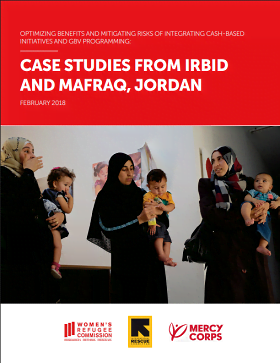
Optimizing Benefits and Mitigating Risks of Integrating Cash-Based Initiatives and GBV Programming: Case Studies from Irbid and Mafraq, Jordan
Report
This case study provides an overview of assessment and monitoring activities
conducted by Mercy Corps and the International Rescue Committee in partnership with the Women’s Commission to:
a. mainstream gender-based violence (GBV) considerations in cash-based interventions
b. utilize cash within a GBV...

Cash Transfer Programming in Somaliland
Report
This report brings together reflections from a one-day learning event which took place in Hargeisa in March 2018. Participants reflected on what aspects of cash transfer programming worked well in the 2017 response and what needs to be improved going forward. In addition, there was a discussion about the...
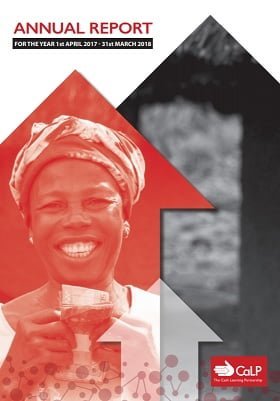
The CALP Network Annual Report 2017-18
Report
The CALP Network’s Annual Report for the financial year 2017-18 gives an overview of the progress made by the network of 74 organizations towards the priorities laid out in the Global Framework for Action. It provides a roundup of new research and training resources in the world of cash, as well as...
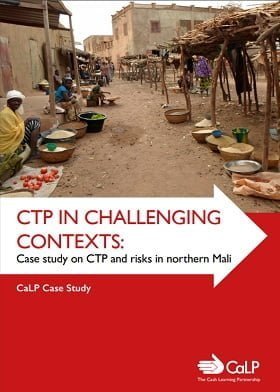
CTP in Challenging Contexts: Case study on CTP and risks in northern Mali
Report
This case study was commissioned by the the CALP Network as the first output under the 2018–2019 workstream on cash transfer programming (CTP) and associated risks. The study aims to contribute to the body of evidence on CTP-related risks and mitigation strategies by drawing lessons learnt and...

Can limited-term cash transfers confer (lasting) child protection benefits?
Presentation
The USAID-funded Aspires project, implemented by FHI360, ChildFund International and AVSI, developed evidence and programming guidance on how economic interventions can facilitate the reintegration of separated children into families, and also prevent unnecessary separation of children from their families.

Vale Electrónico – Programación basada en efectivo de vales electrónicos
Guía y herramientas
El vale electrónico ofrece la posibilidad de:
– Entregar programas en efectivo a los beneficiarios mediante transferencia de cupones electrónicos.
– Permite el seguimiento digitalizado completo de las transacciones.
– Aumenta la seguridad de las transferencias.
– Delversión de valor y dignidad...
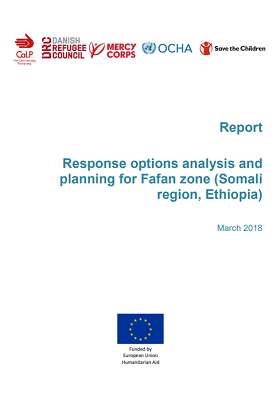
Response options analysis and planning for Fafan zone (Somali region, Ethiopia)
Guidelines and Tools
Between October 2017 and March 2018, the Consortium began the pilot in Ethiopia with the aim of providing technical and strategic support to country-based humanitarian organisations, enabling them to engage in collaborative assessments and decision making. Whilst the Consortium has not been conceived to...
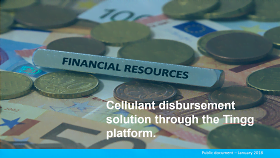
Cellulant disbursement solution through the Tingg platform
Report
Tingg brings payments and commerce all together. It provides a set of tools that enable our various users to make/receive payments online and offline. Aside of payment tools/channels, Tingg also provides a marketplace to enable very small, small and medium enterprises to easily showcase and promote their...
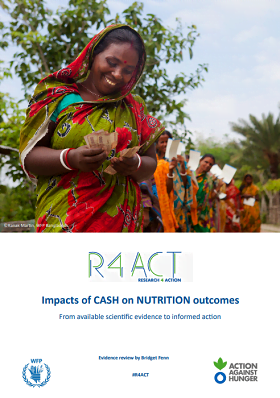
Impacts of Cash on Nutrition outcomes
Report
Following the presentation of the Grand Bargain agreement at the 2016 World Humanitarian Summit, the use of cash transfers has become a key component of humanitarian assistance and humanitarian actors and policy-makers increasingly recognize the need for more evidence-based interventions to support their...
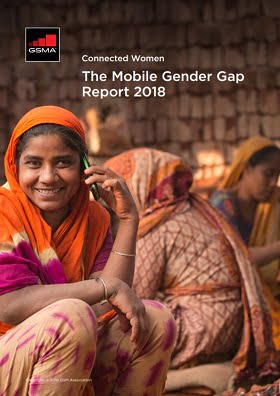
The Mobile Gender Gap Report 2018
Report
This report reveals for the first time the magnitude of the gender gap in mobile internet use across low- and middle-income countries, as well as highlighting the persistent gender disparity in mobile ownership and the barriers to ownership and use. Findings from this report are based on the results of...
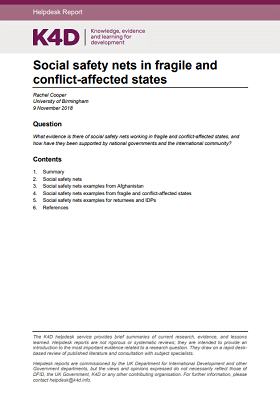
Social Safety Nets in Fragile and Conflict-Affected States
Report
This rapid review synthesises evidence on social safety net in fragile and conflict-affected states and how they have been supported by national governments and the international community. First section will discuss about the scope of social safety net and followed by examples from Afghanistan. Second...

E-Transfer implementation guide
Guidelines and Tools
This updated E-transfer Implementation Guide replaces the original guide published in 2014. In cash transfer programming (CTP), electronic transfers (e-transfers) are a digital replacement for paper vouchers or physical cash. E-transfers are a disbursement mechanism – a way of transferring money, goods...

Tracking Cash & Voucher Assistance Workshop – Part 2: Report
Presentation
Do you want to read the latest on discussions on how to best track cash and voucher assistance in global interagency reporting systems? The CALP Network and ECHO have just released Tracking Cash & Voucher Assistance Workshop – Part 2: Report. Key recommendations emerging from the workshop are summarized...

CTP Operational Models Analytical Framework
Guidelines and Tools
The State of the World’s Cash Report launched by the CALP Network in February 2018 highlights trends in the uptake of various operational models for the delivery of cash at scale in humanitarian response. Current decision making on the choice between these various operational models is highly influenced...

Digital Financial Service Ecosystems in Bidi Bidi Refugee Settlement
Report
A report about the Digital financial services ecosystem Bidibidi refugee settlement, Uganda. This document consists of a mapping of the six pillars of the DFS in Bidibidi Refugee Settlement and Host Community, with funding from UNCDF.
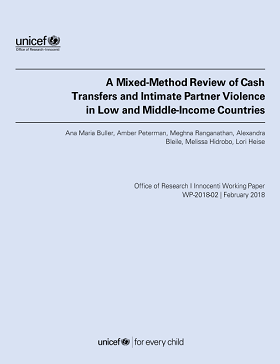
A mixed-method review of cash transfers and intimate partner violence in low and middle-income countries
Report
There is increasing evidence that cash transfer (CT) programs decrease intimate partner violence (IPV); however, little is known about how CTs achieve this impact. We conducted a mixed method review of studies in low- and middle-income countries. Fourteen quantitative and nine qualitative studies met our...

Cash Transfer Programming in Armed Conflict: The ICRC’s Experience
Report
Money is the main means of survival for most people around the world. That remains the case in situations of armed conflict, when having cash to buy essential goods can mean the difference between life and death.
The ICRC’s experience shows that cash is an essential tool in humanitarian action in armed...

Cash Impact on Food Security and Non-Food Outcomes: Ministudy I
Report
To better understand how different amounts and frequencies of cash transfer impact household food security outcomes and non-food outcomes (food well-being, financial well-being, ability to cope with shocks and stresses and household well-being), this study adopted a randomised control design with two...
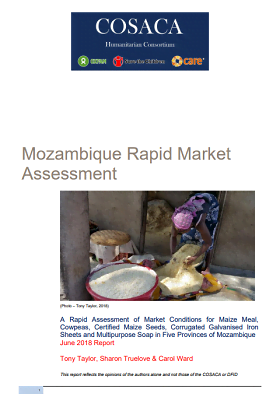
Mozambique Rapid Market Assessment
Report
Mozambique is a country prone to natural disasters, most markedly floods, cyclones, pest and disease outbreaks and frequent droughts. These regularly exacerbate the underlying poverty and food security situation and cause major damage and set back economic growth in disaster-affected areas. Meteorological...
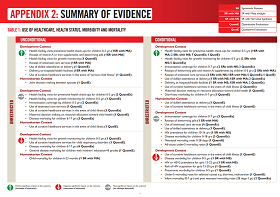
Appendix 2: Summary Of Evidence
Report
Table 1: Use of Healthcare, Health Status, Morbidity and Mortality